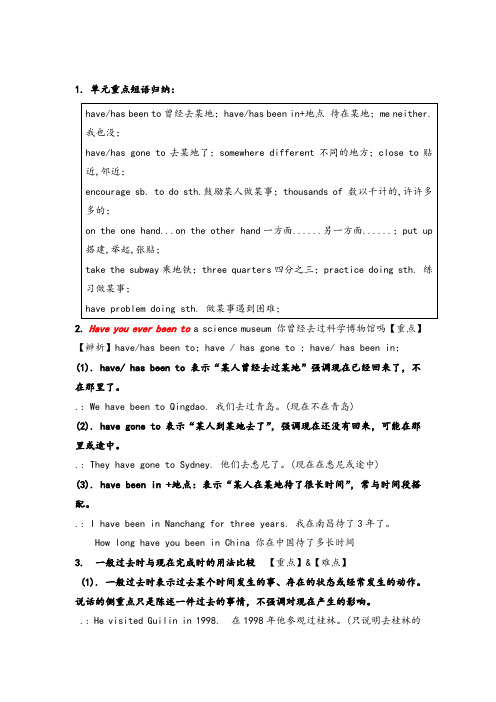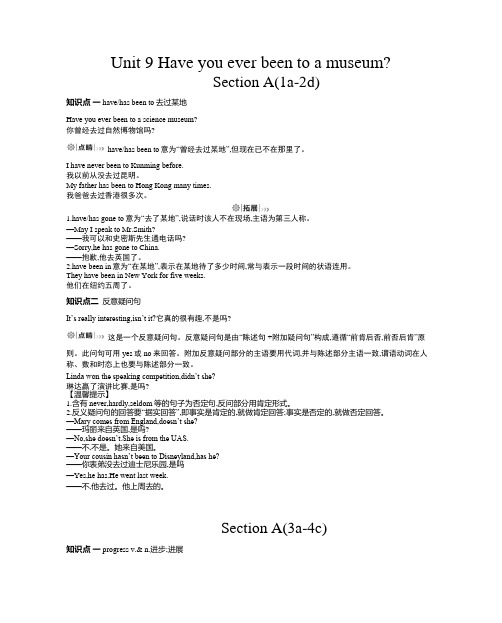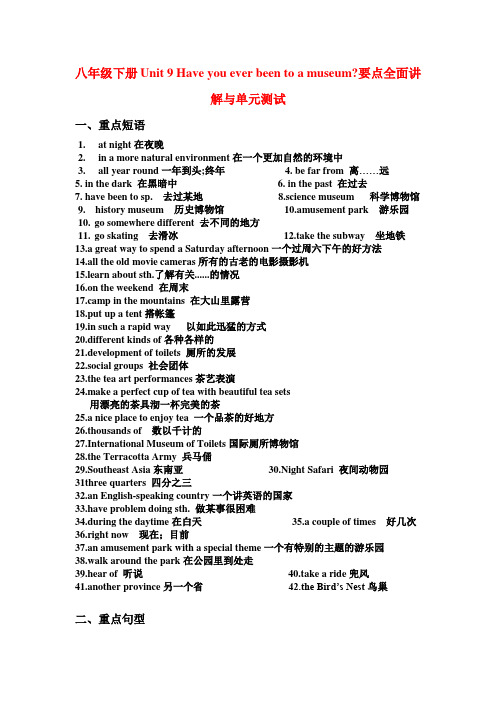八年级英语下册Unit9HaveyoueverbeentoamuseumSectionA(GrammarFocus_4c)导学课件(新版)
unit9haveyoueverbeentoamuseum知识点梳理及单元复习

1. 单元重点短语归纳:2. Have you ever been to a science museum 你曾经去过科学博物馆吗【重点】【辨析】have/has been to;have / has gone to ;have/ has been in;(1). have/ has been to 表示“某人曾经去过某地”强调现在已经回来了,不在那里了。
.: We have been to Qingdao. 我们去过青岛。
(现在不在青岛)(2). have gone to表示“某人到某地去了”,强调现在还没有回来,可能在那里或途中。
.: They have gone to Sydney. 他们去悉尼了。
(现在在悉尼或途中)(3). have been in +地点:表示“某人在某地待了很长时间”,常与时间段搭配。
.: I have been in Nanchang for three years. 我在南昌待了3年了。
How long have you been in China 你在中国待了多长时间3. 一般过去时与现在完成时的用法比较【重点】&【难点】(1). 一般过去时表示过去某个时间发生的事、存在的状态或经常发生的动作。
说话的侧重点只是陈述一件过去的事情,不强调对现在产生的影响。
.: He visited Guilin in 1998. 在1998年他参观过桂林。
(只说明去桂林的时间)(2). 现在完成时表示动作发生在过去,对现在造成了影响或产生了结果。
不能与确定的过去时间状语连用。
.: Jill has bought a new computer. 吉尔买了一台新电脑。
I have taught here for fifteen years. 我在这儿教学已经15年了。
I have seen the film. 我看过这部电影。
(我了解这部电影的内容)I saw the film last week. 我上周看了这部电影。
八年级英语下册Unit9Haveyoueverbeentoamuseum重点归纳笔记(带答案)

八年级英语下册Unit9Haveyoueverbeentoamuseum重点归纳笔记单选题1、—What a fine day! Let’s go for a picnic, ________?—Sounds like a good idea.A.shall weB.don’t weC.can we答案:A句意:——多好的天气啊!我们去野餐,好吗?——听起来是个好主意。
考查反意疑问句。
根据题干中“Let’s go for a picnic, ________?”可知反意疑问句的陈述部分是以let's开头的祈使句,疑问部分用shall we。
故选A。
2、—How do you improve your spoken English?—By practicing _____________ to my teachers and classmates.A.talkingB.to talkC.talk答案:A句意:——你如何提高你的英语口语的?——通过和老师和同学们练习交谈。
考查动词形式。
practice练习,根据practice doing“练习做某事”可知,故选A。
小提示:跟动名词做宾语的动词(词组):完成、实践、值得忙finish, practice, be worth, be busy继续、习惯、可放弃keep on, be used to, give up考虑、建议、不禁想consider, suggest, can’t help, feel like喜欢、思念、要介意enjoy, miss, mind3、—Mark, let’s go to the Center Museum together.—Good idea. There are many interesting things in November’s ________. A.exhibitionsB.inventionsC.instrumentsD.operations答案:A句意:——马克,我们一起去中心博物馆吧。
八年级英语下册Unit9Haveyoueverbeentoamuseum知识汇总笔记(带答案)

八年级英语下册Unit9Haveyoueverbeentoamuseum知识汇总笔记单选题1、In fact he knows this place very well, for he ________ there three times.A.has beenB.has been toC.has goneD.has gone to答案:A句意:事实上他对这个地方非常熟悉,因为他去过那儿三次了。
考查现在完成时。
there是副词,前面不可加介词to,因此排除BD两项;又因为该句是说“他去过那儿”,所以用he has been there。
has/have gone to一般是表示某人去了某地,还没回来。
故选A。
2、Every year, _________ books are given away to the poor children in the countryside. A.thousandB.thousands ofC.thousand ofD.thousands答案:B句意:每年,成千上万的书被分发给农村的贫困儿童。
考查thousand的用法。
当thousand前有具体基数词时,表示确数,thousand后不加-s,也不加of;当thousand前没有具体基数词时,表示约数,thousand后既加-s,也要加of。
故选B。
3、______ visitors come to Gulangyu during May Day holiday every year.A.Thousands ofB.Two thousandsC.Thousand ofD.Thousand答案:A句意:每年在五一期间成千上万的游客来鼓浪屿。
thousand千,表示具体数时,与数词连用,不加s;表示约数时,与of连用,加s,thousands of成千上万,故选A。
4、Before you ask someone for help, find out he is the right person for your problem. A.sinceB.thatC.whetherD.unless答案:C句意:在你向别人寻求帮助前,先确定他是否是适合你的问题的人。
八年级英语下册 Unit 9 Have you ever been to a muse

单元语法聚焦九
( B ) 8.2017·重庆B John and I ________to visit his grandparents
last Sunday afternoon.
A.go
B.went
C.will go
D.have gone
【解析】考查动词的时态。根据句中的时间状语“last Sunday afternoon” 可知,用一般过去时态,故选B。
单元语法聚焦九
( B ) 5.2017·泰州 Neither Jim nor Tom _______ Australia before,
but they know the country very well.
A.has gone to
B.has been to
C.have gone to D.have beento, have gone to 与 have been in
1.have been to 表示“去过某地”,现在已经不在那个地方了。如: My uncle has been to Beijing twice. 我叔叔去过北京两次。 2.have gone to 表示“去某地了”,指现在到了某地或在去某地的 途中。如: The Greens have gone to Dalian for a holiday. 格林一家去大连度假了。
Unit 9 Have you ever been to a museum?
单元语法聚焦九
Unit 9 Have you ever been to a museum?
单元语法聚焦九
语法精 讲 语法精 练
单元语法聚焦九
语法精讲
一、含ever 和 never的句式
ever 和 never虽同为现在完成时的标志词,但用法不尽相同。 ever 意为“曾经”,表示肯定意思,可用于肯定句、否定句和疑问 句。never 意为“从不”,表示否定意思,常用来回答含有ever的一 般疑问句。
人教新目标版初中英语八年级下册Unit9Haveyoueverbeentoamuseum要点讲解

Unit 9 Have you ever been to a museum?Section A(1a-2d)知识点一have/has been to去过某地Have you ever been to a science museum?你曾经去过自然博物馆吗?have/has been to意为“曾经去过某地”,但现在已不在那里了。
I have never been to Kunming before.我以前从没去过昆明。
My father has been to Hong Kong many times.我爸爸去过香港很多次。
1.have/has gone to意为“去了某地”,说话时该人不在现场,主语为第三人称。
—May I speak to Mr.Smith?——我可以和史密斯先生通电话吗?—Sorry,he has gone to China.——抱歉,他去英国了。
2.have been in意为“在某地”,表示在某地待了多少时间,常与表示一段时间的状语连用。
They have been in New York for five weeks.他们在纽约五周了。
知识点二反意疑问句It’s really interesting,isn’t it?它真的很有趣,不是吗?这是一个反意疑问句。
反意疑问句是由“陈述句 +附加疑问句”构成,遵循“前肯后否,前否后肯”原则。
此问句可用yes或no来回答。
附加反意疑问部分的主语要用代词,并与陈述部分主语一致,谓语动词在人称、数和时态上也要与陈述部分一致。
Linda won the speaking competition,didn’t she?琳达赢了演讲比赛,是吗?【温馨提示】1.含有never,hardly,seldom等的句子为否定句,反问部分用肯定形式。
2.反义疑问句的回答要“据实回答”,即事实是肯定的,就做肯定回答;事实是否定的,就做否定回答。
—Mary comes from England,doesn’t she?——玛丽来自英国,是吗?—No,she doesn’t.She is from the UAS.——不,不是。
河南省八年级英语下册Unit9Haveyoueverbeentoamuseum解题技巧总结

河南省八年级英语下册Unit9Haveyoueverbeentoamuseum解题技巧总结单选题1、—Hi, Tom! _________ you ever _________ the Bird’s Nest?—Yes, I have. It’s fantastic.A.Have; been toB.Have; gone toC.Did; go to答案:A句意:——嗨!汤姆!你去过鸟巢吗?——是的,我去过。
那太棒了!考查现在完成时。
由答语“Yes, I have.”可知,问句用现在完成时,排除C项;have been to表示“曾经去过某地(现在已经回来了)”;have gone to表示“去了某地(还没有回来)”。
分析语境可知,此处是问“你曾经去过鸟巢吗?”,应用have been to。
故选A。
2、—Do you like English?—Yes, but I think__________ is a great challenge to learn the language well.A.thatB.thisC.it答案:C句意:——你喜欢英语么?——是的,但是我认为把语言学好是一种挑战。
考查代词。
that那个;this这个;it它。
think后是省略that的宾语从句,不定式“to learn the language well”是从句的真正的主语,此处用it做宾语从句的形式主语。
故选C。
3、— Peter, have you ever been to the English Corner?— Oh, yes. I ________ there to practice speaking once a week last term.A.wentB.goC.have goneD.will go答案:A句意:——彼得,你去过英语角吗?——哦,是的。
上学期我每周去一次那里练习口语。
考查一般过去时。
洛阳市八年级英语下册Unit9Haveyoueverbeentoamuseum知识点总结归纳完整版

洛阳市八年级英语下册Unit9Haveyoueverbeentoamuseum知识点总结归纳完整版单选题1、— ________ you ever ________ to Hong Kong?— Yes, only once.A.Did; goB.Have; goneC.Do; goD.Have; been答案:D句意:——你去过香港吗?——是的,只有一次。
考查时态。
根据答句“Yes, only once.”可知,问句表示“你曾去过香港吗?”表示“曾经去过某地”用“have/has ever been to+地点”。
故选D。
2、— May I speak to Mr. Black?— Sorry, he ______ Hong Kong. But he ______ in a few days.A.has been to; will comeB.has gone to; will comeC.has been to; cameD.has gone to; came答案:B句意:——我可以和布莱克先生说话吗?——对不起,他去香港了,但是几天后他会回来。
考查时态。
have gone to“去了某地”,说话时作句子主语的人不在现场;have been to“去过某地”,现在已不在那里了;由“Sorry”可知,布莱克先生不在现场,他去了香港,应使用has gone to,排除A/C;后句的时间状语是“in a few days”,是一般将来时的时间状语,所以后句应使用一般将来时will come,故选B。
3、We should not go outside, in such a terrible storm. A.probablyB.especiallyC.immediatelyD.exactly答案:B句意“我们不应该出去,特别是在这种恐怖的风暴的情况下”。
A.可能地;B.特别地(表示进一步强调);C.立刻地;D.正确地,精确地。
八年级英语下册Unit9Haveyoueverbeentoamuseum知识汇总笔记(带答案)

八年级英语下册Unit9Haveyoueverbeentoamuseum知识汇总笔记单选题1、In fact he knows this place very well, for he ________ there three times.A.has beenB.has been toC.has goneD.has gone to答案:A句意:事实上他对这个地方非常熟悉,因为他去过那儿三次了。
考查现在完成时。
there是副词,前面不可加介词to,因此排除BD两项;又因为该句是说“他去过那儿”,所以用he has been there。
has/have gone to一般是表示某人去了某地,还没回来。
故选A。
2、Every year, _________ books are given away to the poor children in the countryside. A.thousandB.thousands ofC.thousand ofD.thousands答案:B句意:每年,成千上万的书被分发给农村的贫困儿童。
考查thousand的用法。
当thousand前有具体基数词时,表示确数,thousand后不加-s,也不加of;当thousand前没有具体基数词时,表示约数,thousand后既加-s,也要加of。
故选B。
3、______ visitors come to Gulangyu during May Day holiday every year.A.Thousands ofB.Two thousandsC.Thousand ofD.Thousand答案:A句意:每年在五一期间成千上万的游客来鼓浪屿。
thousand千,表示具体数时,与数词连用,不加s;表示约数时,与of连用,加s,thousands of成千上万,故选A。
4、Before you ask someone for help, find out he is the right person for your problem. A.sinceB.thatC.whetherD.unless答案:C句意:在你向别人寻求帮助前,先确定他是否是适合你的问题的人。
八年级英语下册 Unit 9 Have you ever been to a muse

Unit 9 Have you ever been to a museum? (No.41—45)Period 1Step 1 Greetings and RevisionGreet the class and check the homework.Step 2 Lead-in1. Guess the places of the pictures; they are the British Museum, space museum, history museum, water park, zoo, amusement park while lead in sentence patterns:“ Have you ever been to …?”2. SpeakingGet students to work in pairs to prac tice the conversation: “ Have you ever been to…”“Yes, I have”/ Not, I haven’t.Step 3 Pre-listening1. Section A1aT: OK. Now open your books on Page 65. In Part1a, 6 places are given. Please read the names of these places. (Teacher writes the names on the blackboard.) Which of these places would you like to visit? Rank them from 1 to 5.S 4: Amusement park ______, water park ______, zoo ______ aquarium ______ space museum ______.S 5: Space museum ______, aquarium ______, zoo ______, water park ______, amusement park ______S6: …2. Talk about the pictureStep 4 Listening1. Listen and choose the best answer. The first and the second question aim to listening to time, and the third one aims to listen for the relationship. This activity trains students’ listening ability for listening for specific relationship.1)When did Sarah visit the National Science Museum?A. TodayB. YesterdayC. Last year2)When did Claudia visit the nature museum?A. last yearB. last summerC. Last school trip3)What may the relationship be between the two speakers?A. FriendsB. Teacher and studentC. Mother and kid.Answer: CCA2. Listen again. Listen and check the boxes. Have these students ever been to these places?Science museum HistorymuseumArt museum Nature museum S pace museumClaudiaSarah √Step 5 SpeakingAsk and answer in pairs:A: let’s go somewhere different today.B: OK. Where do you want to go?A: Have you ever been to the space museum?B: No, I haven’t. How about you?A: …Step 6 Listening2a2b1. Listen and circle the places that you hear.2. Listen again and circle T for true or F for false. Conversation 11. Tina went to the space museum last year. T/F2. John has never been to the space museum. T/F3. They are going to take the subway. T/FConversation 21. Linda ha s been to the amusement park. T/F2. Linda went to the amusement park yesterday. T/F3. Linda is going to the amusement park again by bike. T/FConversation 31. Frank had a great time at the water park. T/F2. Frank’s friend has never been to the water park. T/F3. Frank and his friend are going skating. T/FAnswer: TFT TFT FTT3. SpeakingLook at the map in2aand make conversations about the places.A: Have you ever been to the space museum?B: Yes, I have. How about you?A: No, I haven’t.B: Oh, it’s fantastic. Let’s go tomorrow.A: OK. How are we going to get there?B: We can take the subway.4. SpeakingRole-play the conversation in 2d.A: I went to the film museum last weekend. Have you ever been there? …B: Yes, I have. I went there back in April. ……Step 7 Language points1. I learned about the inventions that led to color movies, too. 我还了解了一些发明,它们成就了彩色电影。
河南省八年级英语下册Unit9Haveyoueverbeentoamuseum解题方法技巧

河南省八年级英语下册Unit9Haveyoueverbeentoamuseum解题方法技巧单选题1、—Hi, Tom! _________ you ever _________ the Bird’s Nest?—Yes, I have. It’s fantastic.A.Have; been toB.Have; gone toC.Did; go to答案:A句意:——嗨!汤姆!你去过鸟巢吗?——是的,我去过。
那太棒了!考查现在完成时。
由答语“Yes, I have.”可知,问句用现在完成时,排除C项;have been to表示“曾经去过某地(现在已经回来了)”;have gone to表示“去了某地(还没有回来)”。
分析语境可知,此处是问“你曾经去过鸟巢吗?”,应用have been to。
故选A。
2、—Do you like English?—Yes, but I think__________ is a great challenge to learn the language well.A.thatB.thisC.it答案:C句意:——你喜欢英语么?——是的,但是我认为把语言学好是一种挑战。
考查代词。
that那个;this这个;it它。
think后是省略that的宾语从句,不定式“to learn the language well”是从句的真正的主语,此处用it做宾语从句的形式主语。
故选C。
3、—Where’s your English teacher?— She ________ to Beijing. She’ll be back in a week.A.has beenB.has goneC.goesD.went答案:B句意:——你的英语老师在哪儿?——她去了北京。
她将在一周后回来。
考查动词时态。
have been to…“去过某地”;have gone to…“去了某地”,根据“She’ll be back in a week.”可知,她去了北京,现在不在这儿,用“have/has gone to +地点”来表示。
八年级英语下册Unit9Haveyoueverbeentoamuseum单元语法知识梳理人教版

Unit 9 Have you ever been to a museum现在完成时(Ⅱ)1.现在完成时表示经历的用法现在完成时常用have been to(去过),ever(曾经),never(从没)等表示经历。
用法说明示例have / has been to表示去过某地,可以与never,ever,just,once等连用。
Mr. Smith has ever been to China three times.史密斯先生曾去过中国三次。
ever常用于现在完成时的一般疑问句中,放在主语之后,过去分词之前。
Have you ever visited the Palace Museum? 你曾参观过故宫博物馆吗?never表示否定,用在助动词have / has之后,过去分词之前。
表示否定的简短回答可以用neither。
—I have never been to Hong Kong.我从来没去过香港。
—Me neither.我也没去过。
2.have/ has been to与have / has gone to的用法区别用法说明示例have/ has been to意为“去过某地”,表示去过某地,现在已经回来了,通常与表示次数的状语连用,如twice,several times,ever,never等She has been to Europe twice.她去过欧洲两次。
(已经回来了)I have never been to the Great Wall.我从未去过长城。
have / has gone to意为“去了某地”,表示到某地去了,强调说话时去某地的人不在场(可能在途中,也可能已到达)。
—Where is Jim? 吉姆在哪里?—He has gone to England.他去英国了。
(现在不在这里)若have/ has been to或have / has gone to后接副词,则省略to。
八年级下册Unit 9 Have you ever been to a museum要点讲解

八年级下册Unit 9 Have you ever been to a museum?要点全面讲解与单元测试一、重点短语1.at night在夜晚2.in a more natural environment在一个更加自然的环境中3.all year round一年到头;终年4. be far from 离……远5. in the dark 在黑暗中6. in the past 在过去7. have been to sp. 去过某地8.science museum 科学博物馆9.history museum 历史博物馆10.amusement park 游乐园10.go somewhere different 去不同的地方11.go skating 去滑冰12.take the subway 坐地铁13.a great way to spend a Saturday afternoon一个过周六下午的好方法14.all the old movie cameras所有的古老的电影摄影机15.learn about sth.了解有关......的情况16.on the weekend 在周末17.camp in the mountains 在大山里露营18.put up a tent搭帐篷19.in such a rapid way 以如此迅猛的方式20.different kinds of各种各样的21.development of toilets 厕所的发展22.social groups 社会团体23.the tea art performances茶艺表演24.make a perfect cup of tea with beautiful tea sets用漂亮的茶具沏一杯完美的茶25.a nice place to enjoy tea 一个品茶的好地方26.thousands of 数以千计的27.International Museum of Toilets国际厕所博物馆28.the Terracotta Army 兵马俑29.Southeast Asia东南亚30.Night Safari 夜间动物园31three quarters 四分之三32.an English-speaking country一个讲英语的国家33.have problem doing sth. 做某事很困难34.during the daytime在白天35.a couple of times 好几次36.right now 现在;目前37.an amusement park with a special theme一个有特别的主题的游乐园38.walk around the park在公园里到处走39.hear of 听说40.take a ride兜风41.another province另一个省42.the Bird’s Nest鸟巢二、重点句型1. Have you ever been to... ?Have you ever been to a science museum? 你曾经去过科学博物馆吗?2. Let’s do sth 让我们一起去做某事吧Let’s go somewhere different today.我们今天去个不同的地方吧。
- 1、下载文档前请自行甄别文档内容的完整性,平台不提供额外的编辑、内容补充、找答案等附加服务。
- 2、"仅部分预览"的文档,不可在线预览部分如存在完整性等问题,可反馈申请退款(可完整预览的文档不适用该条件!)。
- 3、如文档侵犯您的权益,请联系客服反馈,我们会尽快为您处理(人工客服工作时间:9:00-18:30)。
单项选择 ( B )1. Both his parents look sad. Maybe they what’s happened to him. A. knew B. have known C. must know D.will know ( B )2. He has been to Shanghai, has he? A. already B. never C. ever D. still ( C )3. Have you met Mr. Li ? A. just B. ago C. before D. a moment ago ( C )4. —These farmers have been to the United States. —Really? When there? A. will they go B. do they go C. did they go D. have they gone
按要求写出下列动词的不同形式。你能正确运用这些动词的 不同形式吗?
★探究一 1. 小组讨论,说说你们通过自主学习所得到的收获。把要点记下 来,在班上交流讨论。 2. 四人一组,检查核对活动4a中的练习答案。分析错误原因,交 流题中每个动词形式运用的依据。 3. 四人一组,检查核对4b的答案。说说在语篇中每个动词形式运 用的依据。
( A )5. — you your homework yet? —Yes. I it a moment ago. A. Have; done; finished B. Have; done; have finished C. Did; do; finished D. Will; do; finish ( A )6. Miss Green isn’t in the office. She to the library. A. has gone B. went C. will go D. has been
现在完成时可用来表示 过去已经发生或已经完成 的动作对现
在造成的影响或结果,常和already,
ever never,
, just,
before ,
yet 等副词连用。在运用现在完
成时态时,要注意区分不同的时间副词的用法,还要注意和其
他时态的区别运用。
与amuse有关的单词
amuse v. 逗笑;逗乐
characters and movies.
B: What can we see there?
A: ...
★探究三 两人一组,完成4c的活动任务。先回答表中的调查问题,然后通 过对话获得你的搭档的相关信息。 A: Have you ever been to another province in China?
★探对话,看谁改编得最精彩。
A: Have you ever been to Disneyland?
B: No, I haven’t. What’s it like?
A: It’s an amusement park with a special theme—Disney
B: Yes, I have. I went to Hainan last summer.
A: What did you do there? B: I went to Sanya on vacation. I visited the beautiful beach and enjoyed some nice sea food there. What about you? Have you ever been to another province in China? A: ...
amused adj. 逗乐的;觉得好笑的
amusing adj. 逗人笑的;有乐趣的
amusement n. 娱乐;娱乐活动;游戏
